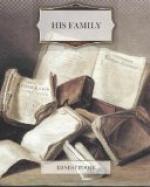“I don’t know,” said Roger huskily. He felt a tightening at his throat. Abruptly he turned to his grandson.
“George,” he asked, “what do you want to be?” The boy flushed under his freckles.
“I don’t know as I know. I’m thinking,” he answered very slowly.
“Talk it over with your mother, son.”
“Yes, sir,” came the prompt reply. “But he won’t,” reflected Roger.
“Or if you ever feel you want to, have a good long talk with me.”
“Yes, sir,” was the answer. Roger stood there waiting, then turned and walked slowly out of the barn. How these children grew up inside of themselves. Had boys always grown like that? Well, perhaps, but how strange it was. Always new lives, lives of their own, the old families scattering over the land. So the great life of the nation swept on. He kept noticing here deserted farms, and one afternoon in the deepening dusk he rode by a graveyard high up on a bare hillside. A horse and buggy were outside, and within he spied a lean young woman neatly dressed in a plain dark suit. With a lawn mower brought from home she was cutting the grass on her family lot. And she seemed to fit into the landscape. New England had grown very old.
* * * * *
Late one night toward the end of July, there came a loud honk from down the hill, then another and another. And as George in his pajamas came rushing from his bedroom shouting radiantly, “Gee! It’s dad!”—they heard the car thundering outside. Bruce had left New York at dawn and had made the run in a single day, three hundred and eleven miles. He was gray with dust all over and he was worn and hollow eyed, but his dark visage wore a look of solid satisfaction.




